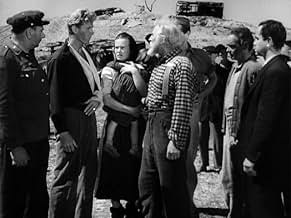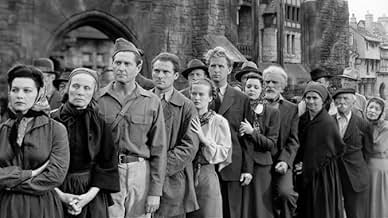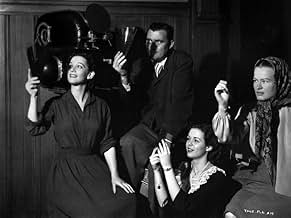Füge eine Handlung in deiner Sprache hinzuIn the dying days of World War II a German agent infiltrates a recently liberated Belgian town. His aim is to turn them against their Allied liberators.In the dying days of World War II a German agent infiltrates a recently liberated Belgian town. His aim is to turn them against their Allied liberators.In the dying days of World War II a German agent infiltrates a recently liberated Belgian town. His aim is to turn them against their Allied liberators.
- Auszeichnungen
- 1 wins total
Helen Beverley
- Mrs. Martha Varin
- (as Helen Beverly)
Richard Aherne
- Sergeant Patrick O'Farrell
- (as Richard Nugent)
Ludwig Donath
- Schmidt
- (as Louis Donath)
Gigi Perreau
- Baby
- (as Ghislaine Perreau)
Axel Anderson
- Nazi Officer
- (Nicht genannt)
George Blagoi
- Nazi Officer
- (Nicht genannt)
Sammy Blum
- Alex
- (Nicht genannt)
Empfohlene Bewertungen
Based on the title and the first few minutes, this looks like it will be a kind of "Boys from Brazil" story about Neo-Nazis out to reclaim the world, but it's actually a rather run-of-the-mill WWII propaganda melodrama of betrayal and loyalty. George Coulouris plays von Beck, a Nazi general who leads a group of "inner circle" Nazis on the eve of Germany's surrender (the movie was released after D-Day but before the actual surrender). Glad to leave the weakened Hitler behind, the group goes underground, intending to get new identities and foment dissent among the liberated peoples of the former Third Reich. In Belgium, Coulouris pretends to be his brother, moves in with his sister-in-law and her daughter (who were seen as collaborators by the villagers), and tries to derail the Allies to return the land to nomality. Paul Guilfoyle (father to the Paul Guilfoyle who currently plays Brass on CSI) is Coulouris' first conquest in his propaganda battle. Lloyd Bridges is a former concentration camp prisoner and Nancy Gates is his girlfriend. The most interesting character is Helena, played by Osa Massen, who was raped by a German soldier and subsequently bore a child (Gigi Perreau in a wordless performance). The two have become semi-outcasts, seen as tainted by Nazi blood. There is some nice use of light and shadow in some scenes but aside from its interesting set-up, nothing very exciting goes on. After the opening, we never see any of the other "inner circle" Nazis and the whole film becomes a story of the villagers struggling to trust each other again. One of the worst lines of dialogue in any WWII movie occurs here when Bridges has to say, at an inspiring moment, "When the Lord made people, he had a great idea!" Massen is the best actor in the picture, even though she is saddled with having to look wide-eyed and sinister for the first half of the film until her secret shame (which we guess early on) finally comes out.
George Coulouris is nazi Colonel von Beck, near the end of WW II. as a high official, he is sent off to hide in Belgium, hopefully to re-ignite the nazi mission again, by turning the liberated town folk against the americans, and each other. it's even more interesting that this was made in 1944, while the war was still going on! co-stars thirty year old Lloyd Bridges, as Frank Bartoc, and Nancy Gates as Nina. Pretty good film! von Beck tries to stir up mistrust, some of the locals seem to go along with him. some religion. talk of hope. rebuilding. allegiance. faith in beliefs and trust. One of only five films directed by Biberman. he was caught up in the House Un-american Activities Committee actions, in the 1940s. he, his wife Gale Sondergaard, and many others were blocked from working in hollywood, as they refused to testify before the committee. This one is pretty good... could have been great, but I think because the war was still going on, a lot of it is "propaganda" acting, to give hope to those back home, and to prove to the audience that we were on the side of right.
This film unfortunately is a corny and inferior one, which is a terrible shame, because the subject deserved an excellent treatment. The subject is the fate of Nazism at the end of World War II. From 1944, Nazism began a process of planned 'metastasis', a word which I take from oncology to compare its spread to that of cancer cells when the central tumor is abandoned as the main base of the disease and the cancerous cells spread throughout the body. This is shown in this prescient early film, at the beginning of the story, where officers of the Wehrmacht are given sealed instructions and false identities to spread themselves throughout the world and work in secret for the restitution of Nazi ideals in the future. George Coulouris plays the wicked Colonel von Beck who presides over this, and is the villain of the film. It was not the Wehrmacht officers who did this in reality, but the SS. And the process was set up and presided over by Heinrich Himmler and Martin Bormann. Some conspiracy theorists suggest that Bormann got away and that his 'skull' which was found was not really his. We do not need to concern ourselves with that issue here. When the Allies got to Berlin they found the Berlin Treasury empty. All the gold of conquered Europe had been stored there. It was never found. Its value today would be trillions of dollars. The ingots had apparently been hidden in poisonous chemical tanks of the chemical company I. G. Farben (the main foreign 'front' for the Gestapo throughout the 1930s and the War), since gold cannot be damaged by any chemicals, and only the unstable mixture of two separate acids known as aqua regia can dissolve it. The gold was shipped out to safe havens like Sweden, Chile, and Argentina, over a period of time. Nobody opens poisonous chemical tanks to inspect what might be at the bottom. Apparently, ten percent of the gold was meant to be permanently stored as a 'backup' and still is stored. The rest has over the decades been used by the metastasized Nazis to buy international corporations and banks and attempt to achieve economic dominance and power, with a collection of bribed 'tame politicians' to assist them along the way. Many of their collaborators do not even know that they are working for metastasized Nazis, because all the collaborators care about is the money. The new Nazi Internationalists threw the Hitler cult overboard, just as shown in this film. The film was written and directed by Herbert J. Biberman, an inferior writer and director in Hollywood who had been a member of the Communist-leaning theatrical group in New York known as 'the Group'. He was later blacklisted during the McCarthy Era. It appears that he was a member of the Communist Party. Certainly, the corny creation of a hero of the Soviets as a character in this film is the kind of nonsense one expects of political hacks when they get too carried away making movies, and cannot resist inserting some propaganda into a film which then makes the story partially absurd. I mention all of this because it appears that Biberman was given some accurate information about what the SS were up to in their programme of 'Planned Metastasis', and I believe it must have come to him from the Soviet agents by way of Party contacts. How else could he possibly have concocted this story so early on, as even today people are still figuring out what really happened? Therefore, Biberman was performing a genuine service by informing the public of the process at this early date. But he did so with such lack of skill and talent, and with such adolescent propagandistic fervour, that the film has made no lasting impact, and its message was lost. The unlikely spot of Kolar, Belgium, is chosen as the supposed location of all the action, if you can call it action. The film contains a fine performance by the Danish actress Osa Massen as a German woman who has been raped by German soldiers and borne a child who has no name because of the shame. Lloyd Bridges plays her husband who returns and struggles to come to terms with the situation, but his performance is mediocre, as there is not much in the script and even less in the direction to give him much to do other than to wrinkle his brow and look earnest from time to time. This film could and should have been an impressive one, but it is not. Someone should try this theme again, and make it work this time.
Set in the near future following Germany's surrender - which probably qualifies it as science fiction - 'The Master Race' was made when being anti-Nazi wasn't yet deemed to be unAmerican and it was still believed that former Nazis were just waiting their chance to stage a comeback.
Representing a key credit for director Herbert J. Biberman, later to be blacklisted as one of the Hollywood Ten - Philip Dorn's portrayal of a noble Russian probably didn't help - and hailing from the days when George Coulouris was playing Nazis in Hollywood, 'The Master Race' contains an early expression of the belief that later became a Marxist commonplace that social forces not individuals decided political outcomes and that Hitler was just the puppet of vested financial interests; made overt by the opening scene when Coulouris glances at a portrait of his erstwhile Fuhrer and says "In defeat he has no value. They can have him...!"
Representing a key credit for director Herbert J. Biberman, later to be blacklisted as one of the Hollywood Ten - Philip Dorn's portrayal of a noble Russian probably didn't help - and hailing from the days when George Coulouris was playing Nazis in Hollywood, 'The Master Race' contains an early expression of the belief that later became a Marxist commonplace that social forces not individuals decided political outcomes and that Hitler was just the puppet of vested financial interests; made overt by the opening scene when Coulouris glances at a portrait of his erstwhile Fuhrer and says "In defeat he has no value. They can have him...!"
The story is about a group of Nazis who try to blend in the with locals in the waning days of the war. One in particular, Colonel Von Beck (George Coulouris) is the star of the film...and his methods seem bent on sowing discontent and chaos. Can the Allies figure out who this man is before it's too late?
According to IMDB, this film was rushed through production in order to capitalize on the recent Allied invasion of France. And, while I watched, the film did have a hurried feel to it. It wasn't due to the acting or music or cinematography but the story itself...a story that seemed like it needed a re-write as some of it was a bit rough. Some examples of how heavy-handed and shallow some of the scenes were would be the incredibly over-idealized Russian doctor as well as the church scene. In addition the film uses one of the worst cliches in film history...a person telling the evil person that they are going to turn them in to the authorities! You just KNOW what's gonna happen to this woman!
By the way, despite me not enjoying the story, George Coulouris was wonderful as the Nazi agent...and he was always excellent in playing awful characters.
According to IMDB, this film was rushed through production in order to capitalize on the recent Allied invasion of France. And, while I watched, the film did have a hurried feel to it. It wasn't due to the acting or music or cinematography but the story itself...a story that seemed like it needed a re-write as some of it was a bit rough. Some examples of how heavy-handed and shallow some of the scenes were would be the incredibly over-idealized Russian doctor as well as the church scene. In addition the film uses one of the worst cliches in film history...a person telling the evil person that they are going to turn them in to the authorities! You just KNOW what's gonna happen to this woman!
By the way, despite me not enjoying the story, George Coulouris was wonderful as the Nazi agent...and he was always excellent in playing awful characters.
Wusstest du schon
- Wissenswertes"Lux Radio Theater" broadcast a 60 minute radio adaptation of the movie on Januray 15, 1945 with George Coulouris and Helen Beverley reprising their film roles.
- PatzerThe British officer Captain William Forsythe gives a palm down American style salute.
- Zitate
Senior Lt. Andrei Krestov: I'm a doctor. or I was. and I can play the mouth fork.
Major Phil Carson: I was afraid of that.
- VerbindungenFeatured in Hollywood the Golden Years: The RKO Story: Dark Victory (1987)
Top-Auswahl
Melde dich zum Bewerten an und greife auf die Watchlist für personalisierte Empfehlungen zu.
Details
- Erscheinungsdatum
- Herkunftsland
- Sprache
- Auch bekannt als
- La raça suprema
- Drehorte
- Produktionsfirma
- Weitere beteiligte Unternehmen bei IMDbPro anzeigen
- Laufzeit1 Stunde 35 Minuten
- Farbe
- Seitenverhältnis
- 1.37 : 1
Zu dieser Seite beitragen
Bearbeitung vorschlagen oder fehlenden Inhalt hinzufügen

































